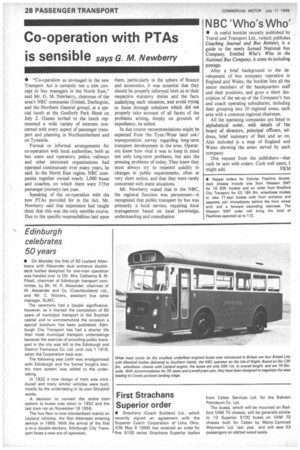Co-operation with PTAs
Page 30

If you've noticed an error in this article please click here to report it so we can fix it.
is sensible says G. M. Newberry
• "Co-operation as envisaged in the new Transport Act is certainly not a new concept to bus managers in the North East," said Mr. G. M. Newberry, chairman of the area's NBC companies (United, Darlington, and the Northern General group), at a special lunch at the Gosforth Park Hotel on July 2, Guests invited to the lunch represented a wide variety of interests concerned with every aspect of passenger transport and planning in Northumberland and on Tyneside.
Formal or informal arrangements for co-operation with local authorities, both as bus users and operators, police, railways and other interested organizations had operated continuously over many years, he said. In the North East region, NBC companies together owned nearly 2,000 buses and coaches, on which there were 375m passenger journeys last year.
Speaking of the co-operation with the new PTAs provided for in the Act, Mr. Newberry said that experience had taught them that this was the only sensible course. Due to the specific responsibilities laid upon them, particularly in the sphere of finance and economics, it was essential that they should be properly informed both as to their respective statutory duties and the facts underlying each situation, and avoid trying to force through solutions which did not properly take account of all facets of the problems arising, simply on grounds of expediency, he added.
In due course recommendations might be expected from the Tyne /Wear land use/ transportation survey regarding long-term transport development in the area. Operators knew how vital it was to keep in mind not only long-term problems, but also the pressing problems of today. They knew they must always try to respond quickly to changes in public requirements, often at very short notice, and that they were rarely concerned with static situations.
Mr. Newberry stated that in the NBC, the regional function was paramount—it recognized that public transport by bus was primarily a local service, requiring local management based on local knowledge, understanding and consultation.












































































































